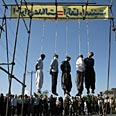
Execution in Iran
צילום: איי אף פי
Rights groups welcome Iran limitations on youth executions
Amnesty International says hopes judicial limitation on executing offenders who committed crimes under the age of 18 will 'pave the way to a complete abolition of the death penalty in Iran'; Human Rights Watch says ban should save more than 130 offenders on death row
A new Iranian judicial directive bans the execution of juvenile offenders for drug crimes but keeps capital punishment for those convicted of murder, a top judiciary official said Saturday.
Hossein Zabhi, Deputy State Public Prosecutor, told The Associated Press that the judges are still required under Iran's Islamic laws to issue death sentences for minors convicted of murder if the victims' family refuses financial compensation.
Human Rights Watch said the directive should save more than 130 offenders on death row.
Activists and the West have criticized Iran for sentencing youths to death for crimes committed while they were juveniles.
Hossein Zebhi, assistant for judicial affairs to Iran's prosecutor-general, said in a statement carried by the official IRNA news agency this week that a directive was issued commuting death sentences for offenders under 18 to life in jail.
"If Iran enacts this judicial ban it will bring the world much closer to ending all executions for crimes committed by children," said Clarisa Bencomo, Middle East children's rights researcher at Human Rights Watch.
"The Iranian legislature should move quickly to protect juveniles in Iran by making the policy legally binding," she said in a statement from the New York-based group on Friday.
West accused of double standards
London-based Amnesty International also welcomed the step in a statement this week, saying it "hopes it will pave the way to a complete abolition of the death penalty in Iran".
Human Rights Watch said a similar directive was issued in 2004 banning executions of people under 18 but said this did not stop judges issuing death sentences against juvenile offenders and sometimes executing people under 18.
Iran regularly rejects accusations of rights abuses, saying it is implementing Islamic sharia law. Tehran accuses Western countries of double standards.
Since January 2005, Iran has been responsible for 26 of the 32 known executions of juvenile offenders worldwide, Human Rights Watch said, adding that six juvenile offenders had been executed in 2008.
Zebhi said offenders under the age of 18 would have their death sentences commuted to life in prison, regardless of the crime. He said the sentence could be reduced for good behavior.
The European Union has been a critic of juvenile executions. It issued a statement in June urging Iran to halt what was at the time the imminent execution of a Saleh Taseb, who committed murder while a minor. Iran later said it was reviewing the case.










